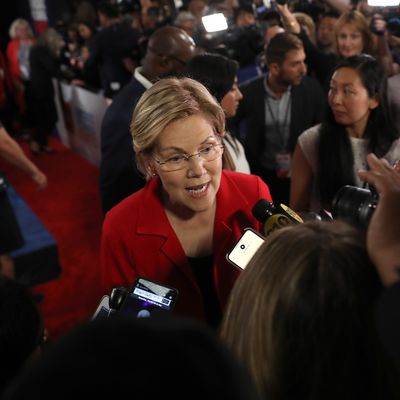
Deep into Wednesday night’s debate, moderator Jake Tapper almost forced one of the Democratic Party’s profound philosophical disagreements into focus.
“Vice-President Biden, last night on this stage, Senator Elizabeth Warren said, quote, ‘We’re not going to solve the urgent problems that we face with small ideas and spinelessness. We’re going to solve them by being the Democratic Party of big, structural change,’” he said, pointing out Trump’s 2016 victory in Michigan. Here, it seemed, was the moment Biden would have to actually confront the essence of the pitch on offer from Warren, the candidate whose message arguably most neatly challenges his way of viewing the world, and the race.
Then, though, Tapper shifted focus, allowing Biden an out. “What do you say to progressives who worry that your proposals are not ambitious enough to energize the progressive wing of your party, which you will need to beat Donald Trump?” Fair question, and Biden took the chance to talk about the work he’d done to revive Detroit in recent years. Fair answer.
But not, ultimately, a question or answer that directly addressed the philosophical gulf between the front-runner — who on Wednesday repeated his insistence that “four more years of Donald Trump will go down as an aberration [but] eight more years of Donald Trump will change America in a fundamental way” — and either of his next two competitors. That includes Warren, the serious challenger with the most obvious upward trajectory in recent months, considering both polling and fundraising — whose entire message is about restructuring the American economy and pieces of the society, which she believes created Trump in the first place.
The clash between those two visions of governing and electability undergirds the entire Democratic primary, but without Warren and Biden onstage together it has yet to play out in the public eye.
A Biden-versus-Warren head-to-head may not be the only way to have this discussion, and not one of the serious contenders’ aides I spoke with in the spin room after either night’s debates in Detroit this week advocated for any kind of artificial field-winnowing that would make that happen, or that would necessarily put those two on the same stage with Bernie Sanders (or with Kamala Harris and Pete Buttigieg, whose campaign visions exist between these poles). But Biden’s name has yet to even come up once on a night when Warren is debating, and when Sanders and Biden were onstage together — in June, in Miami — it was Biden’s substantive disagreements with Harris that dominated the evening.
Biden hasn’t hesitated to confront Warren’s or Sanders’s headline policies, even if he’s not debating them with those candidates directly: Roughly the first hour of Wednesday’s session was dedicated to a discussion of health care, framed around Medicare for All, the Sanders signature plan onto which Warren has signed.
Yet Biden and Warren spoke the most over the last two nights of debating, totaling exactly 40 minutes between them, and their disagreements have still only been implied, not directly confronted. When Warren shot “I don’t understand why anybody goes to all the trouble of running for president of the United States just to talk about what we really can’t do and shouldn’t fight for” at John Delaney on Tuesday night, it was no surprise that some of her allies wished she could aim that elbow at his fellow moderate Biden. And when Biden offered his extended defense of the Affordable Care Act on Wednesday, it was no shock that many in his corner wished he could have made the same points to Warren and Sanders the night before.
Without them onstage together — and without Warren and Harris confronting each other, or Harris and Sanders directly debating — answering the same questions and engaging each other over their visions for campaigning and running the country, audiences could be forgiven for thinking they’re all competing for different voters.
That, of course, is partially true of the primary electorate. But only to a point, especially in early-voting and hyperengaged Iowa and New Hampshire. So this setup, the result of two random draws to determine the debate lineups, makes the true dynamics of the race difficult to assess. A direct discussion between the two loudest visions in the contest would provide clarity not just on the spectrum of policy positions up for discussion but on the shape of the candidates’ support among voters.
As it currently stands, it looks like ten candidates are set to qualify for the next debate in September. If it’s indeed ten, there will almost certainly be just one night of debating, and a version of this discussion will likely, finally, play out.
But if one more pol crosses the support threshold and makes the September debate, the field will probably be split over two debate nights yet again. And that means there’s a good chance this conversation won’t unfold until deep into the fall.






























